IIUM - Islamic Estate Planning in Malaysia: The Central Dilemma
VerifiedAdded on 2023/06/26
|34
|13735
|314
Case Study
AI Summary
This case study examines the challenges and dilemmas surrounding Islamic estate planning (IEP) in Malaysia. It begins by highlighting the underdevelopment of IEP despite the presence of institutions like Amanah Raya Berhad for over 90 years. The study identifies a significant gap between the number of Muslims in Malaysia and those who have declared wasiyyah (wills), revealing a lack of awareness and engagement with IEP. It explores the reasons for this, including the perception that IEP is less commercially attractive than other areas of Islamic finance and the complexity of estate distribution under faraid (Islamic inheritance law). The research uses a qualitative approach, drawing on literature from various sources to address legal and Shariah regulatory issues. The study suggests the potential for establishing a Shariah advisory framework to enhance IEP practices in Malaysia, aiming to improve compliance and address family disputes related to estate distribution. Desklib provides access to this case study, offering valuable insights for students and researchers.
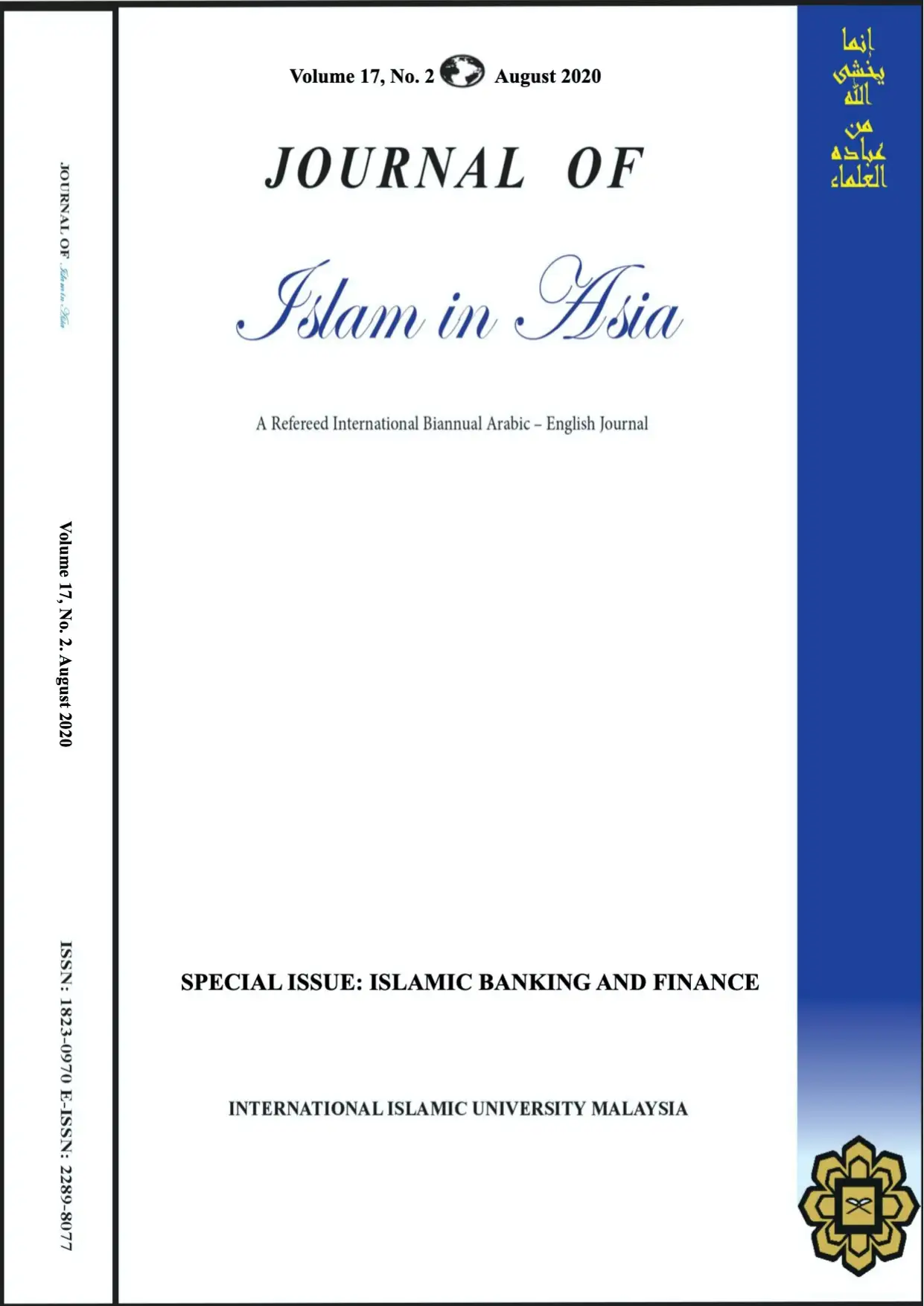
Paraphrase This Document
Need a fresh take? Get an instant paraphrase of this document with our AI Paraphraser
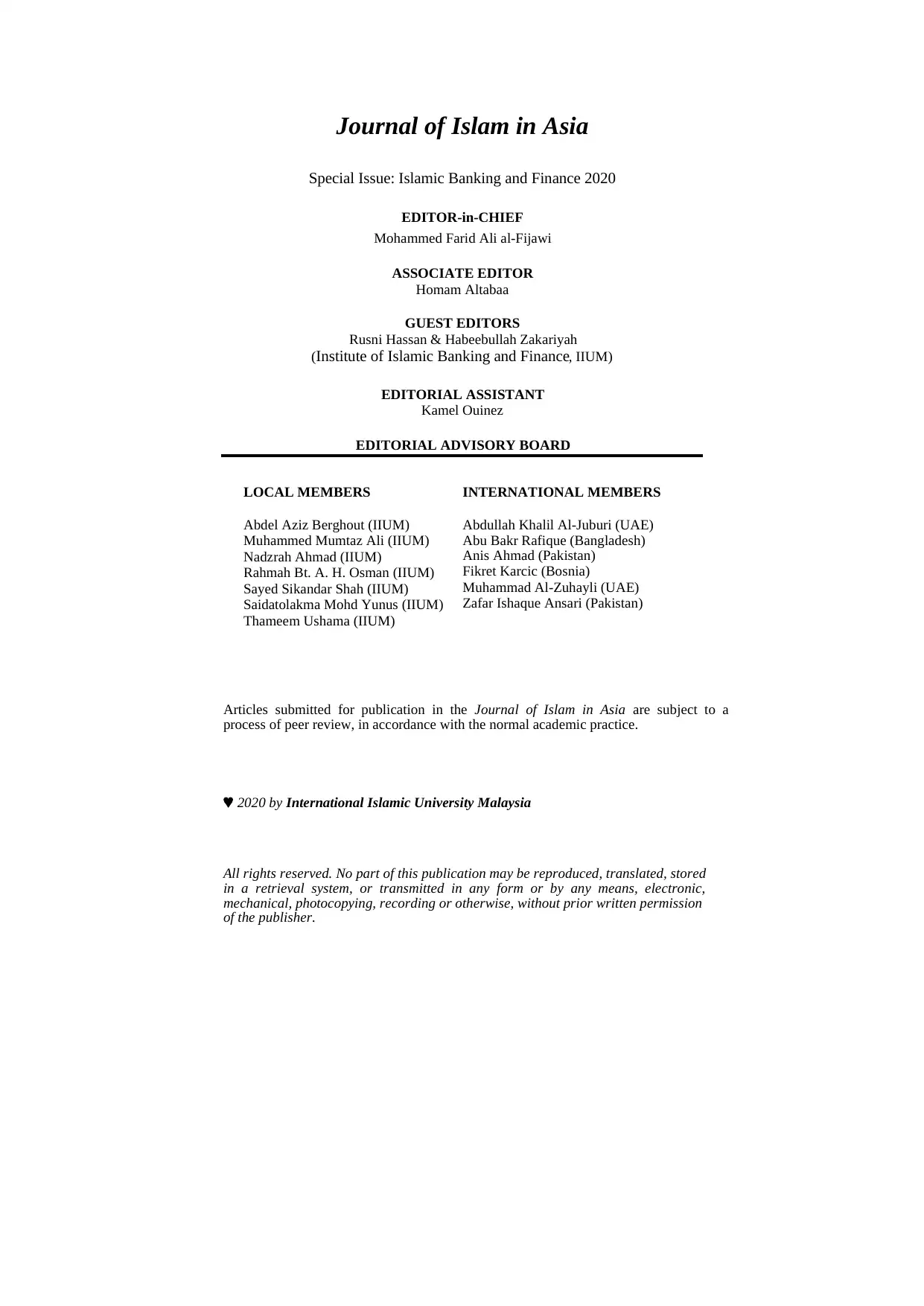
Journal of Islam in Asia
Special Issue: Islamic Banking and Finance 2020
EDITOR-in-CHIEF
Mohammed Farid Ali al-Fijawi
ASSOCIATE EDITOR
Homam Altabaa
GUEST EDITORS
Rusni Hassan & Habeebullah Zakariyah
(Institute of Islamic Banking and Finance, IIUM)
EDITORIAL ASSISTANT
Kamel Ouinez
EDITORIAL ADVISORY BOARD
LOCAL MEMBERS
Abdel Aziz Berghout (IIUM)
Muhammed Mumtaz Ali (IIUM)
Nadzrah Ahmad (IIUM)
Rahmah Bt. A. H. Osman (IIUM)
Sayed Sikandar Shah (IIUM)
Saidatolakma Mohd Yunus (IIUM)
Thameem Ushama (IIUM)
INTERNATIONAL MEMBERS
Abdullah Khalil Al-Juburi (UAE)
Abu Bakr Rafique (Bangladesh)
Anis Ahmad (Pakistan)
Fikret Karcic (Bosnia)
Muhammad Al-Zuhayli (UAE)
Zafar Ishaque Ansari (Pakistan)
Articles submitted for publication in the Journal of Islam in Asia are subject to a
process of peer review, in accordance with the normal academic practice.
© 2020 by International Islamic University Malaysia
All rights reserved. No part of this publication may be reproduced, translated, stored
in a retrieval system, or transmitted in any form or by any means, electronic,
mechanical, photocopying, recording or otherwise, without prior written permission
of the publisher.
Special Issue: Islamic Banking and Finance 2020
EDITOR-in-CHIEF
Mohammed Farid Ali al-Fijawi
ASSOCIATE EDITOR
Homam Altabaa
GUEST EDITORS
Rusni Hassan & Habeebullah Zakariyah
(Institute of Islamic Banking and Finance, IIUM)
EDITORIAL ASSISTANT
Kamel Ouinez
EDITORIAL ADVISORY BOARD
LOCAL MEMBERS
Abdel Aziz Berghout (IIUM)
Muhammed Mumtaz Ali (IIUM)
Nadzrah Ahmad (IIUM)
Rahmah Bt. A. H. Osman (IIUM)
Sayed Sikandar Shah (IIUM)
Saidatolakma Mohd Yunus (IIUM)
Thameem Ushama (IIUM)
INTERNATIONAL MEMBERS
Abdullah Khalil Al-Juburi (UAE)
Abu Bakr Rafique (Bangladesh)
Anis Ahmad (Pakistan)
Fikret Karcic (Bosnia)
Muhammad Al-Zuhayli (UAE)
Zafar Ishaque Ansari (Pakistan)
Articles submitted for publication in the Journal of Islam in Asia are subject to a
process of peer review, in accordance with the normal academic practice.
© 2020 by International Islamic University Malaysia
All rights reserved. No part of this publication may be reproduced, translated, stored
in a retrieval system, or transmitted in any form or by any means, electronic,
mechanical, photocopying, recording or otherwise, without prior written permission
of the publisher.
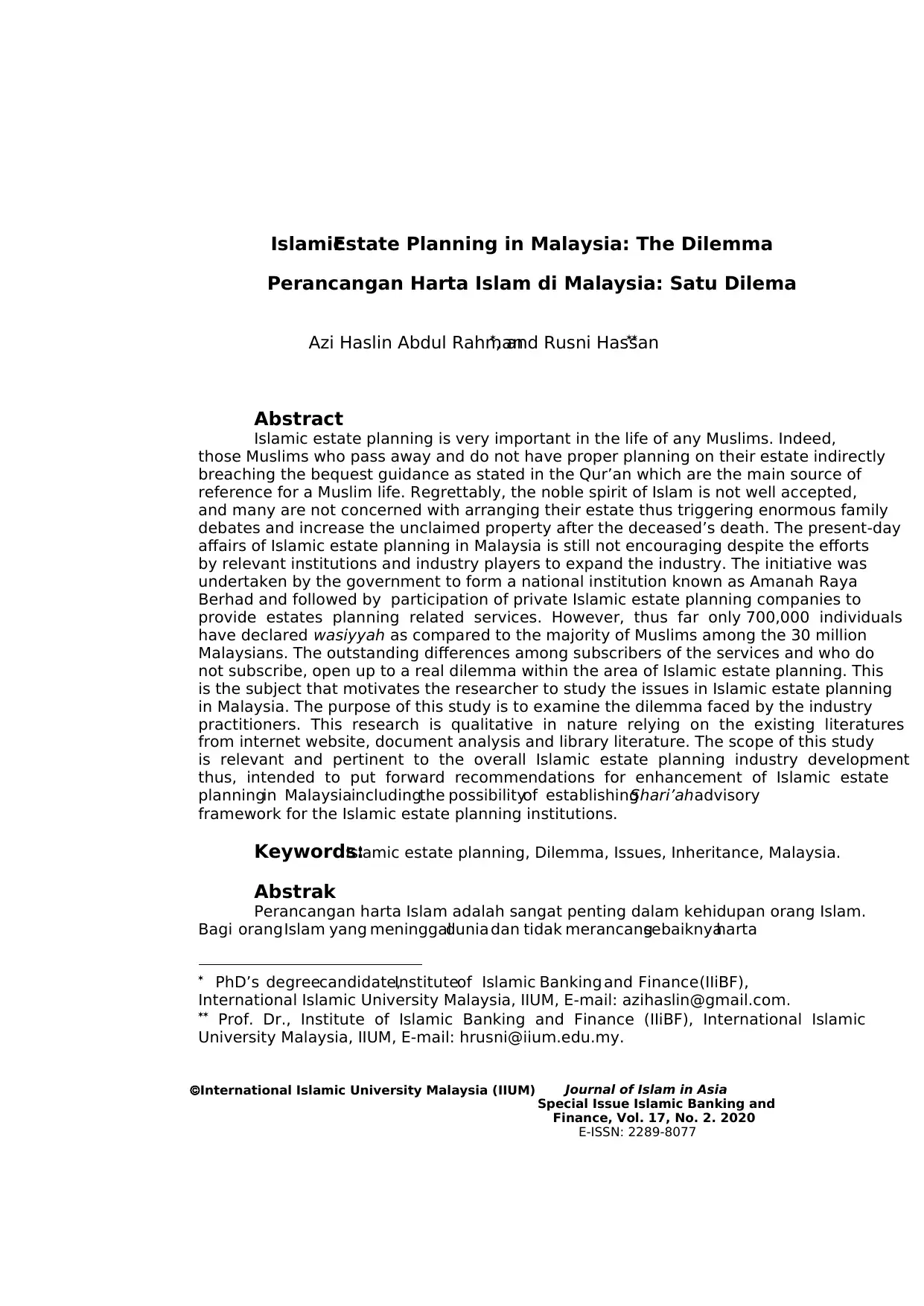
International Islamic University Malaysia (IIUM) Journal of Islam in Asia
Special Issue Islamic Banking and
Finance, Vol. 17, No. 2. 2020
E-ISSN: 2289-8077
IslamicEstate Planning in Malaysia: The Dilemma
Perancangan Harta Islam di Malaysia: Satu Dilema
Azi Haslin Abdul Rahman, and Rusni Hassan
Abstract
Islamic estate planning is very important in the life of any Muslims. Indeed,
those Muslims who pass away and do not have proper planning on their estate indirectly
breaching the bequest guidance as stated in the Qur’an which are the main source of
reference for a Muslim life. Regrettably, the noble spirit of Islam is not well accepted,
and many are not concerned with arranging their estate thus triggering enormous family
debates and increase the unclaimed property after the deceased’s death. The present-day
affairs of Islamic estate planning in Malaysia is still not encouraging despite the efforts
by relevant institutions and industry players to expand the industry. The initiative was
undertaken by the government to form a national institution known as Amanah Raya
Berhad and followed by participation of private Islamic estate planning companies to
provide estates planning related services. However, thus far only 700,000 individuals
have declared wasiyyah as compared to the majority of Muslims among the 30 million
Malaysians. The outstanding differences among subscribers of the services and who do
not subscribe, open up to a real dilemma within the area of Islamic estate planning. This
is the subject that motivates the researcher to study the issues in Islamic estate planning
in Malaysia. The purpose of this study is to examine the dilemma faced by the industry
practitioners. This research is qualitative in nature relying on the existing literatures
from internet website, document analysis and library literature. The scope of this study
is relevant and pertinent to the overall Islamic estate planning industry development
thus, intended to put forward recommendations for enhancement of Islamic estate
planningin Malaysiaincludingthe possibilityof establishingShari’ah advisory
framework for the Islamic estate planning institutions.
Keywords:Islamic estate planning, Dilemma, Issues, Inheritance, Malaysia.
Abstrak
Perancangan harta Islam adalah sangat penting dalam kehidupan orang Islam.
Bagi orang Islam yang meninggaldunia dan tidak merancangsebaiknyaharta
PhD’s degreecandidate,Instituteof Islamic Banking and Finance (IIiBF),
International Islamic University Malaysia, IIUM, E-mail: azihaslin@gmail.com.
Prof. Dr., Institute of Islamic Banking and Finance (IIiBF), International Islamic
University Malaysia, IIUM, E-mail: hrusni@iium.edu.my.
Special Issue Islamic Banking and
Finance, Vol. 17, No. 2. 2020
E-ISSN: 2289-8077
IslamicEstate Planning in Malaysia: The Dilemma
Perancangan Harta Islam di Malaysia: Satu Dilema
Azi Haslin Abdul Rahman, and Rusni Hassan
Abstract
Islamic estate planning is very important in the life of any Muslims. Indeed,
those Muslims who pass away and do not have proper planning on their estate indirectly
breaching the bequest guidance as stated in the Qur’an which are the main source of
reference for a Muslim life. Regrettably, the noble spirit of Islam is not well accepted,
and many are not concerned with arranging their estate thus triggering enormous family
debates and increase the unclaimed property after the deceased’s death. The present-day
affairs of Islamic estate planning in Malaysia is still not encouraging despite the efforts
by relevant institutions and industry players to expand the industry. The initiative was
undertaken by the government to form a national institution known as Amanah Raya
Berhad and followed by participation of private Islamic estate planning companies to
provide estates planning related services. However, thus far only 700,000 individuals
have declared wasiyyah as compared to the majority of Muslims among the 30 million
Malaysians. The outstanding differences among subscribers of the services and who do
not subscribe, open up to a real dilemma within the area of Islamic estate planning. This
is the subject that motivates the researcher to study the issues in Islamic estate planning
in Malaysia. The purpose of this study is to examine the dilemma faced by the industry
practitioners. This research is qualitative in nature relying on the existing literatures
from internet website, document analysis and library literature. The scope of this study
is relevant and pertinent to the overall Islamic estate planning industry development
thus, intended to put forward recommendations for enhancement of Islamic estate
planningin Malaysiaincludingthe possibilityof establishingShari’ah advisory
framework for the Islamic estate planning institutions.
Keywords:Islamic estate planning, Dilemma, Issues, Inheritance, Malaysia.
Abstrak
Perancangan harta Islam adalah sangat penting dalam kehidupan orang Islam.
Bagi orang Islam yang meninggaldunia dan tidak merancangsebaiknyaharta
PhD’s degreecandidate,Instituteof Islamic Banking and Finance (IIiBF),
International Islamic University Malaysia, IIUM, E-mail: azihaslin@gmail.com.
Prof. Dr., Institute of Islamic Banking and Finance (IIiBF), International Islamic
University Malaysia, IIUM, E-mail: hrusni@iium.edu.my.
⊘ This is a preview!⊘
Do you want full access?
Subscribe today to unlock all pages.

Trusted by 1+ million students worldwide
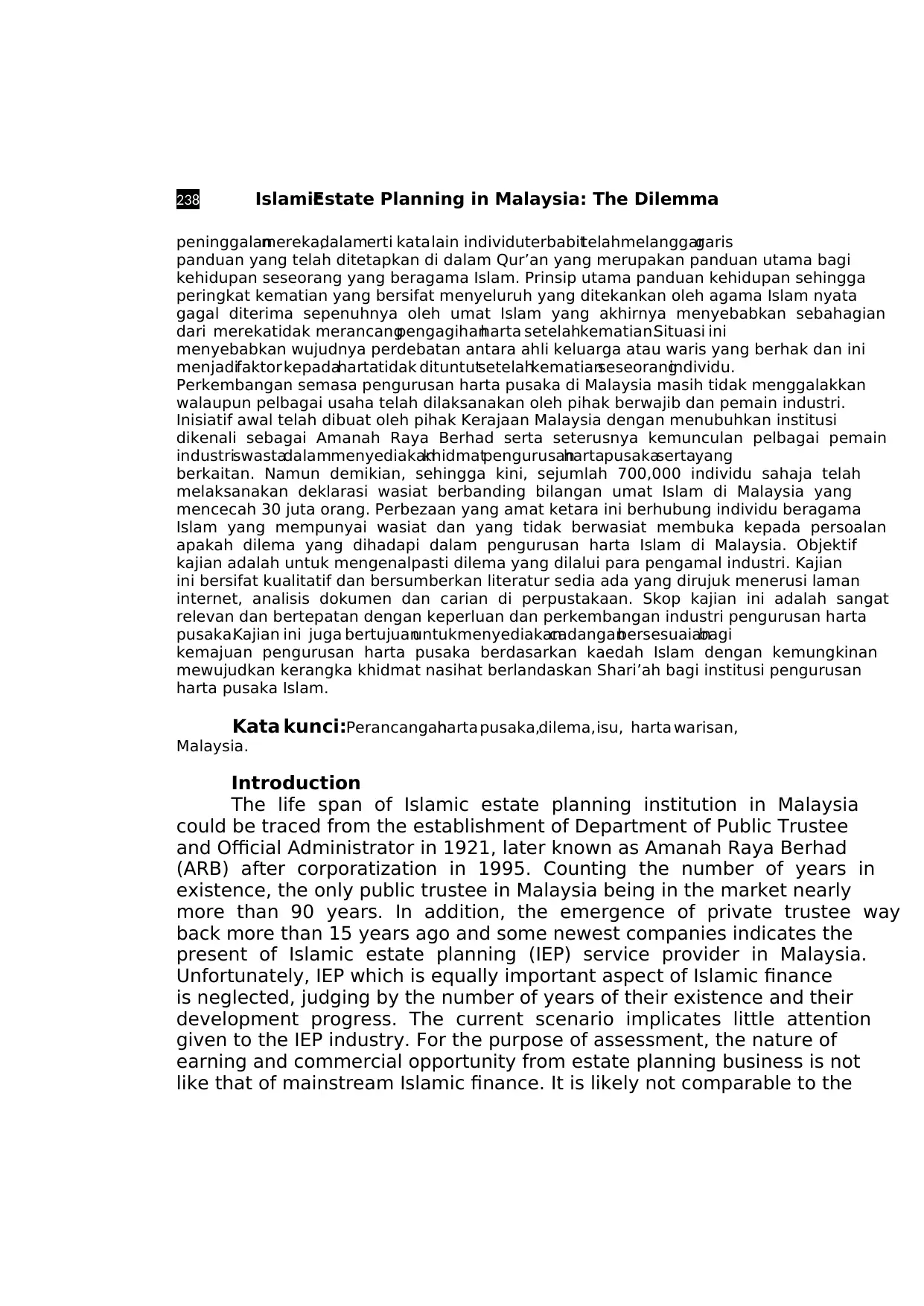
238 IslamicEstate Planning in Malaysia: The Dilemma
peninggalanmereka,dalamerti kata lain individuterbabittelahmelanggargaris
panduan yang telah ditetapkan di dalam Qur’an yang merupakan panduan utama bagi
kehidupan seseorang yang beragama Islam. Prinsip utama panduan kehidupan sehingga
peringkat kematian yang bersifat menyeluruh yang ditekankan oleh agama Islam nyata
gagal diterima sepenuhnya oleh umat Islam yang akhirnya menyebabkan sebahagian
dari merekatidak merancangpengagihanharta setelahkematian.Situasi ini
menyebabkan wujudnya perdebatan antara ahli keluarga atau waris yang berhak dan ini
menjadifaktor kepadahartatidak dituntutsetelahkematianseseorangindividu.
Perkembangan semasa pengurusan harta pusaka di Malaysia masih tidak menggalakkan
walaupun pelbagai usaha telah dilaksanakan oleh pihak berwajib dan pemain industri.
Inisiatif awal telah dibuat oleh pihak Kerajaan Malaysia dengan menubuhkan institusi
dikenali sebagai Amanah Raya Berhad serta seterusnya kemunculan pelbagai pemain
industriswastadalammenyediakankhidmatpengurusanhartapusakasertayang
berkaitan. Namun demikian, sehingga kini, sejumlah 700,000 individu sahaja telah
melaksanakan deklarasi wasiat berbanding bilangan umat Islam di Malaysia yang
mencecah 30 juta orang. Perbezaan yang amat ketara ini berhubung individu beragama
Islam yang mempunyai wasiat dan yang tidak berwasiat membuka kepada persoalan
apakah dilema yang dihadapi dalam pengurusan harta Islam di Malaysia. Objektif
kajian adalah untuk mengenalpasti dilema yang dilalui para pengamal industri. Kajian
ini bersifat kualitatif dan bersumberkan literatur sedia ada yang dirujuk menerusi laman
internet, analisis dokumen dan carian di perpustakaan. Skop kajian ini adalah sangat
relevan dan bertepatan dengan keperluan dan perkembangan industri pengurusan harta
pusaka.Kajian ini juga bertujuanuntukmenyediakancadanganbersesuaianbagi
kemajuan pengurusan harta pusaka berdasarkan kaedah Islam dengan kemungkinan
mewujudkan kerangka khidmat nasihat berlandaskan Shari’ah bagi institusi pengurusan
harta pusaka Islam.
Kata kunci:Perancanganharta pusaka,dilema, isu, harta warisan,
Malaysia.
Introduction
The life span of Islamic estate planning institution in Malaysia
could be traced from the establishment of Department of Public Trustee
and Official Administrator in 1921, later known as Amanah Raya Berhad
(ARB) after corporatization in 1995. Counting the number of years in
existence, the only public trustee in Malaysia being in the market nearly
more than 90 years. In addition, the emergence of private trustee way
back more than 15 years ago and some newest companies indicates the
present of Islamic estate planning (IEP) service provider in Malaysia.
Unfortunately, IEP which is equally important aspect of Islamic finance
is neglected, judging by the number of years of their existence and their
development progress. The current scenario implicates little attention
given to the IEP industry. For the purpose of assessment, the nature of
earning and commercial opportunity from estate planning business is not
like that of mainstream Islamic finance. It is likely not comparable to the
peninggalanmereka,dalamerti kata lain individuterbabittelahmelanggargaris
panduan yang telah ditetapkan di dalam Qur’an yang merupakan panduan utama bagi
kehidupan seseorang yang beragama Islam. Prinsip utama panduan kehidupan sehingga
peringkat kematian yang bersifat menyeluruh yang ditekankan oleh agama Islam nyata
gagal diterima sepenuhnya oleh umat Islam yang akhirnya menyebabkan sebahagian
dari merekatidak merancangpengagihanharta setelahkematian.Situasi ini
menyebabkan wujudnya perdebatan antara ahli keluarga atau waris yang berhak dan ini
menjadifaktor kepadahartatidak dituntutsetelahkematianseseorangindividu.
Perkembangan semasa pengurusan harta pusaka di Malaysia masih tidak menggalakkan
walaupun pelbagai usaha telah dilaksanakan oleh pihak berwajib dan pemain industri.
Inisiatif awal telah dibuat oleh pihak Kerajaan Malaysia dengan menubuhkan institusi
dikenali sebagai Amanah Raya Berhad serta seterusnya kemunculan pelbagai pemain
industriswastadalammenyediakankhidmatpengurusanhartapusakasertayang
berkaitan. Namun demikian, sehingga kini, sejumlah 700,000 individu sahaja telah
melaksanakan deklarasi wasiat berbanding bilangan umat Islam di Malaysia yang
mencecah 30 juta orang. Perbezaan yang amat ketara ini berhubung individu beragama
Islam yang mempunyai wasiat dan yang tidak berwasiat membuka kepada persoalan
apakah dilema yang dihadapi dalam pengurusan harta Islam di Malaysia. Objektif
kajian adalah untuk mengenalpasti dilema yang dilalui para pengamal industri. Kajian
ini bersifat kualitatif dan bersumberkan literatur sedia ada yang dirujuk menerusi laman
internet, analisis dokumen dan carian di perpustakaan. Skop kajian ini adalah sangat
relevan dan bertepatan dengan keperluan dan perkembangan industri pengurusan harta
pusaka.Kajian ini juga bertujuanuntukmenyediakancadanganbersesuaianbagi
kemajuan pengurusan harta pusaka berdasarkan kaedah Islam dengan kemungkinan
mewujudkan kerangka khidmat nasihat berlandaskan Shari’ah bagi institusi pengurusan
harta pusaka Islam.
Kata kunci:Perancanganharta pusaka,dilema, isu, harta warisan,
Malaysia.
Introduction
The life span of Islamic estate planning institution in Malaysia
could be traced from the establishment of Department of Public Trustee
and Official Administrator in 1921, later known as Amanah Raya Berhad
(ARB) after corporatization in 1995. Counting the number of years in
existence, the only public trustee in Malaysia being in the market nearly
more than 90 years. In addition, the emergence of private trustee way
back more than 15 years ago and some newest companies indicates the
present of Islamic estate planning (IEP) service provider in Malaysia.
Unfortunately, IEP which is equally important aspect of Islamic finance
is neglected, judging by the number of years of their existence and their
development progress. The current scenario implicates little attention
given to the IEP industry. For the purpose of assessment, the nature of
earning and commercial opportunity from estate planning business is not
like that of mainstream Islamic finance. It is likely not comparable to the
Paraphrase This Document
Need a fresh take? Get an instant paraphrase of this document with our AI Paraphraser
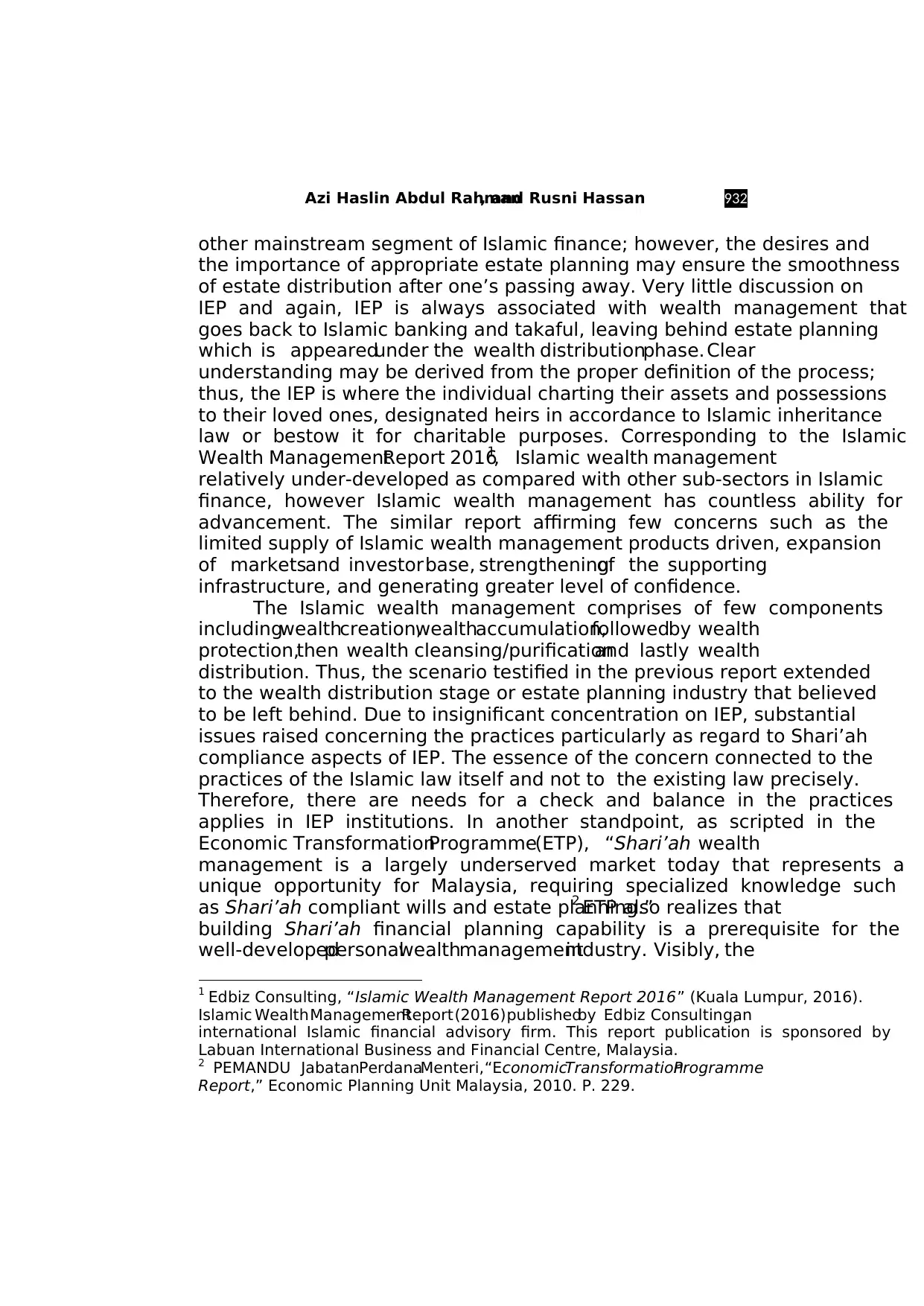
932, and Rusni HassanAzi Haslin Abdul Rahman
other mainstream segment of Islamic finance; however, the desires and
the importance of appropriate estate planning may ensure the smoothness
of estate distribution after one’s passing away. Very little discussion on
IEP and again, IEP is always associated with wealth management that
goes back to Islamic banking and takaful, leaving behind estate planning
which is appearedunder the wealth distributionphase. Clear
understanding may be derived from the proper definition of the process;
thus, the IEP is where the individual charting their assets and possessions
to their loved ones, designated heirs in accordance to Islamic inheritance
law or bestow it for charitable purposes. Corresponding to the Islamic
Wealth ManagementReport 20161, Islamic wealth management
relatively under-developed as compared with other sub-sectors in Islamic
finance, however Islamic wealth management has countless ability for
advancement. The similar report affirming few concerns such as the
limited supply of Islamic wealth management products driven, expansion
of marketsand investor base, strengtheningof the supporting
infrastructure, and generating greater level of confidence.
The Islamic wealth management comprises of few components
includingwealthcreation,wealthaccumulation,followedby wealth
protection,then wealth cleansing/purificationand lastly wealth
distribution. Thus, the scenario testified in the previous report extended
to the wealth distribution stage or estate planning industry that believed
to be left behind. Due to insignificant concentration on IEP, substantial
issues raised concerning the practices particularly as regard to Shari’ah
compliance aspects of IEP. The essence of the concern connected to the
practices of the Islamic law itself and not to the existing law precisely.
Therefore, there are needs for a check and balance in the practices
applies in IEP institutions. In another standpoint, as scripted in the
Economic TransformationProgramme(ETP), “Shari’ah wealth
management is a largely underserved market today that represents a
unique opportunity for Malaysia, requiring specialized knowledge such
as Shari’ah compliant wills and estate planning.”2 ETP also realizes that
building Shari’ah financial planning capability is a prerequisite for the
well-developedpersonalwealthmanagementindustry. Visibly, the
1 Edbiz Consulting, “Islamic Wealth Management Report 2016” (Kuala Lumpur, 2016).
Islamic Wealth ManagementReport (2016) publishedby Edbiz Consulting,an
international Islamic financial advisory firm. This report publication is sponsored by
Labuan International Business and Financial Centre, Malaysia.
2 PEMANDU JabatanPerdanaMenteri, “EconomicTransformationProgramme
Report,” Economic Planning Unit Malaysia, 2010. P. 229.
other mainstream segment of Islamic finance; however, the desires and
the importance of appropriate estate planning may ensure the smoothness
of estate distribution after one’s passing away. Very little discussion on
IEP and again, IEP is always associated with wealth management that
goes back to Islamic banking and takaful, leaving behind estate planning
which is appearedunder the wealth distributionphase. Clear
understanding may be derived from the proper definition of the process;
thus, the IEP is where the individual charting their assets and possessions
to their loved ones, designated heirs in accordance to Islamic inheritance
law or bestow it for charitable purposes. Corresponding to the Islamic
Wealth ManagementReport 20161, Islamic wealth management
relatively under-developed as compared with other sub-sectors in Islamic
finance, however Islamic wealth management has countless ability for
advancement. The similar report affirming few concerns such as the
limited supply of Islamic wealth management products driven, expansion
of marketsand investor base, strengtheningof the supporting
infrastructure, and generating greater level of confidence.
The Islamic wealth management comprises of few components
includingwealthcreation,wealthaccumulation,followedby wealth
protection,then wealth cleansing/purificationand lastly wealth
distribution. Thus, the scenario testified in the previous report extended
to the wealth distribution stage or estate planning industry that believed
to be left behind. Due to insignificant concentration on IEP, substantial
issues raised concerning the practices particularly as regard to Shari’ah
compliance aspects of IEP. The essence of the concern connected to the
practices of the Islamic law itself and not to the existing law precisely.
Therefore, there are needs for a check and balance in the practices
applies in IEP institutions. In another standpoint, as scripted in the
Economic TransformationProgramme(ETP), “Shari’ah wealth
management is a largely underserved market today that represents a
unique opportunity for Malaysia, requiring specialized knowledge such
as Shari’ah compliant wills and estate planning.”2 ETP also realizes that
building Shari’ah financial planning capability is a prerequisite for the
well-developedpersonalwealthmanagementindustry. Visibly, the
1 Edbiz Consulting, “Islamic Wealth Management Report 2016” (Kuala Lumpur, 2016).
Islamic Wealth ManagementReport (2016) publishedby Edbiz Consulting,an
international Islamic financial advisory firm. This report publication is sponsored by
Labuan International Business and Financial Centre, Malaysia.
2 PEMANDU JabatanPerdanaMenteri, “EconomicTransformationProgramme
Report,” Economic Planning Unit Malaysia, 2010. P. 229.
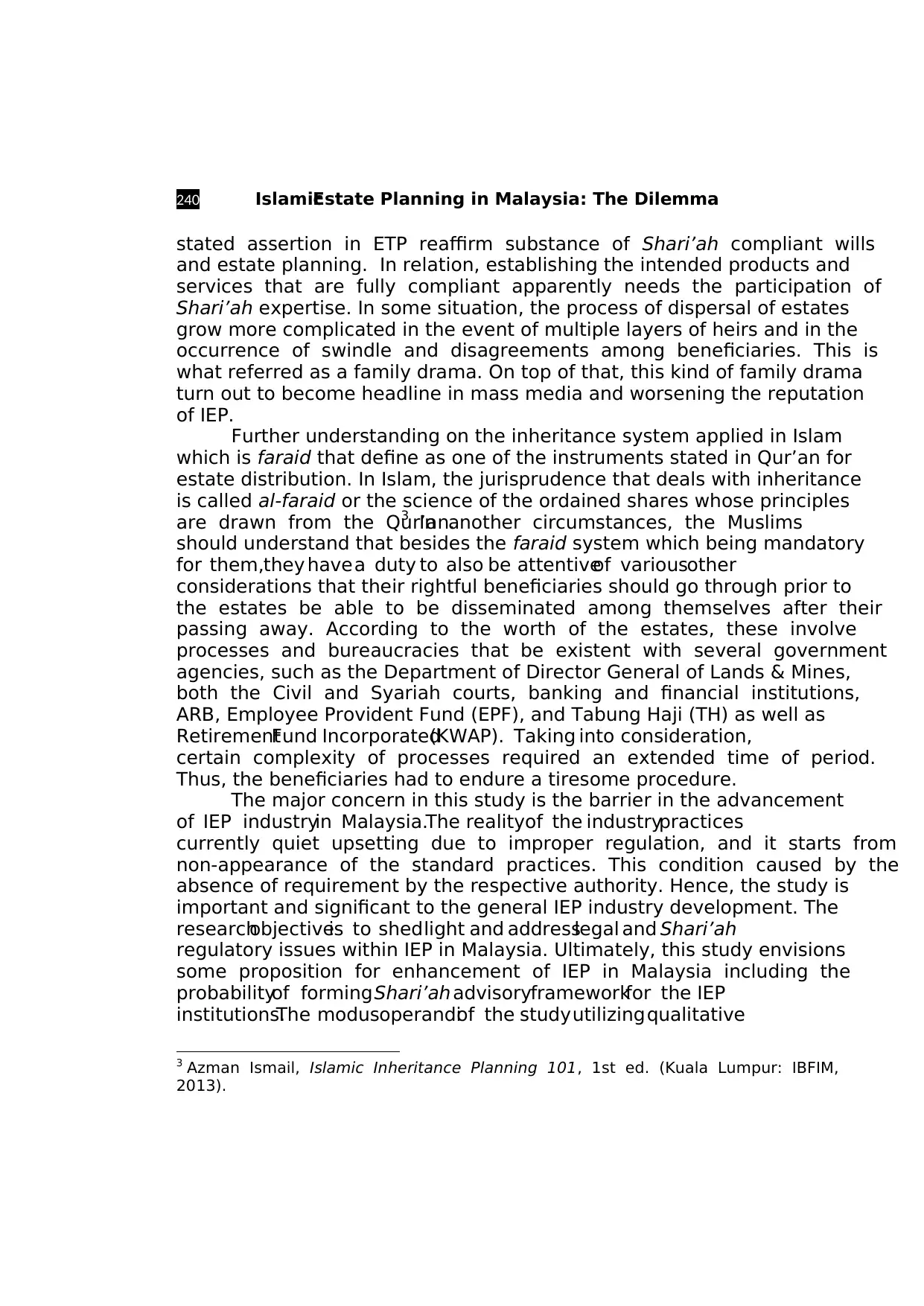
240 IslamicEstate Planning in Malaysia: The Dilemma
stated assertion in ETP reaffirm substance of Shari’ah compliant wills
and estate planning. In relation, establishing the intended products and
services that are fully compliant apparently needs the participation of
Shari’ah expertise. In some situation, the process of dispersal of estates
grow more complicated in the event of multiple layers of heirs and in the
occurrence of swindle and disagreements among beneficiaries. This is
what referred as a family drama. On top of that, this kind of family drama
turn out to become headline in mass media and worsening the reputation
of IEP.
Further understanding on the inheritance system applied in Islam
which is faraid that define as one of the instruments stated in Qur’an for
estate distribution. In Islam, the jurisprudence that deals with inheritance
is called al-faraid or the science of the ordained shares whose principles
are drawn from the Qur’an.3 In another circumstances, the Muslims
should understand that besides the faraid system which being mandatory
for them,they have a duty to also be attentiveof variousother
considerations that their rightful beneficiaries should go through prior to
the estates be able to be disseminated among themselves after their
passing away. According to the worth of the estates, these involve
processes and bureaucracies that be existent with several government
agencies, such as the Department of Director General of Lands & Mines,
both the Civil and Syariah courts, banking and financial institutions,
ARB, Employee Provident Fund (EPF), and Tabung Haji (TH) as well as
RetirementFund Incorporated(KWAP). Taking into consideration,
certain complexity of processes required an extended time of period.
Thus, the beneficiaries had to endure a tiresome procedure.
The major concern in this study is the barrier in the advancement
of IEP industryin Malaysia.The realityof the industrypractices
currently quiet upsetting due to improper regulation, and it starts from
non-appearance of the standard practices. This condition caused by the
absence of requirement by the respective authority. Hence, the study is
important and significant to the general IEP industry development. The
researchobjectiveis to shed light and addresslegal and Shari’ah
regulatory issues within IEP in Malaysia. Ultimately, this study envisions
some proposition for enhancement of IEP in Malaysia including the
probabilityof forming Shari’ah advisoryframeworkfor the IEP
institutions.The modusoperandiof the study utilizing qualitative
3 Azman Ismail, Islamic Inheritance Planning 101, 1st ed. (Kuala Lumpur: IBFIM,
2013).
stated assertion in ETP reaffirm substance of Shari’ah compliant wills
and estate planning. In relation, establishing the intended products and
services that are fully compliant apparently needs the participation of
Shari’ah expertise. In some situation, the process of dispersal of estates
grow more complicated in the event of multiple layers of heirs and in the
occurrence of swindle and disagreements among beneficiaries. This is
what referred as a family drama. On top of that, this kind of family drama
turn out to become headline in mass media and worsening the reputation
of IEP.
Further understanding on the inheritance system applied in Islam
which is faraid that define as one of the instruments stated in Qur’an for
estate distribution. In Islam, the jurisprudence that deals with inheritance
is called al-faraid or the science of the ordained shares whose principles
are drawn from the Qur’an.3 In another circumstances, the Muslims
should understand that besides the faraid system which being mandatory
for them,they have a duty to also be attentiveof variousother
considerations that their rightful beneficiaries should go through prior to
the estates be able to be disseminated among themselves after their
passing away. According to the worth of the estates, these involve
processes and bureaucracies that be existent with several government
agencies, such as the Department of Director General of Lands & Mines,
both the Civil and Syariah courts, banking and financial institutions,
ARB, Employee Provident Fund (EPF), and Tabung Haji (TH) as well as
RetirementFund Incorporated(KWAP). Taking into consideration,
certain complexity of processes required an extended time of period.
Thus, the beneficiaries had to endure a tiresome procedure.
The major concern in this study is the barrier in the advancement
of IEP industryin Malaysia.The realityof the industrypractices
currently quiet upsetting due to improper regulation, and it starts from
non-appearance of the standard practices. This condition caused by the
absence of requirement by the respective authority. Hence, the study is
important and significant to the general IEP industry development. The
researchobjectiveis to shed light and addresslegal and Shari’ah
regulatory issues within IEP in Malaysia. Ultimately, this study envisions
some proposition for enhancement of IEP in Malaysia including the
probabilityof forming Shari’ah advisoryframeworkfor the IEP
institutions.The modusoperandiof the study utilizing qualitative
3 Azman Ismail, Islamic Inheritance Planning 101, 1st ed. (Kuala Lumpur: IBFIM,
2013).
⊘ This is a preview!⊘
Do you want full access?
Subscribe today to unlock all pages.

Trusted by 1+ million students worldwide
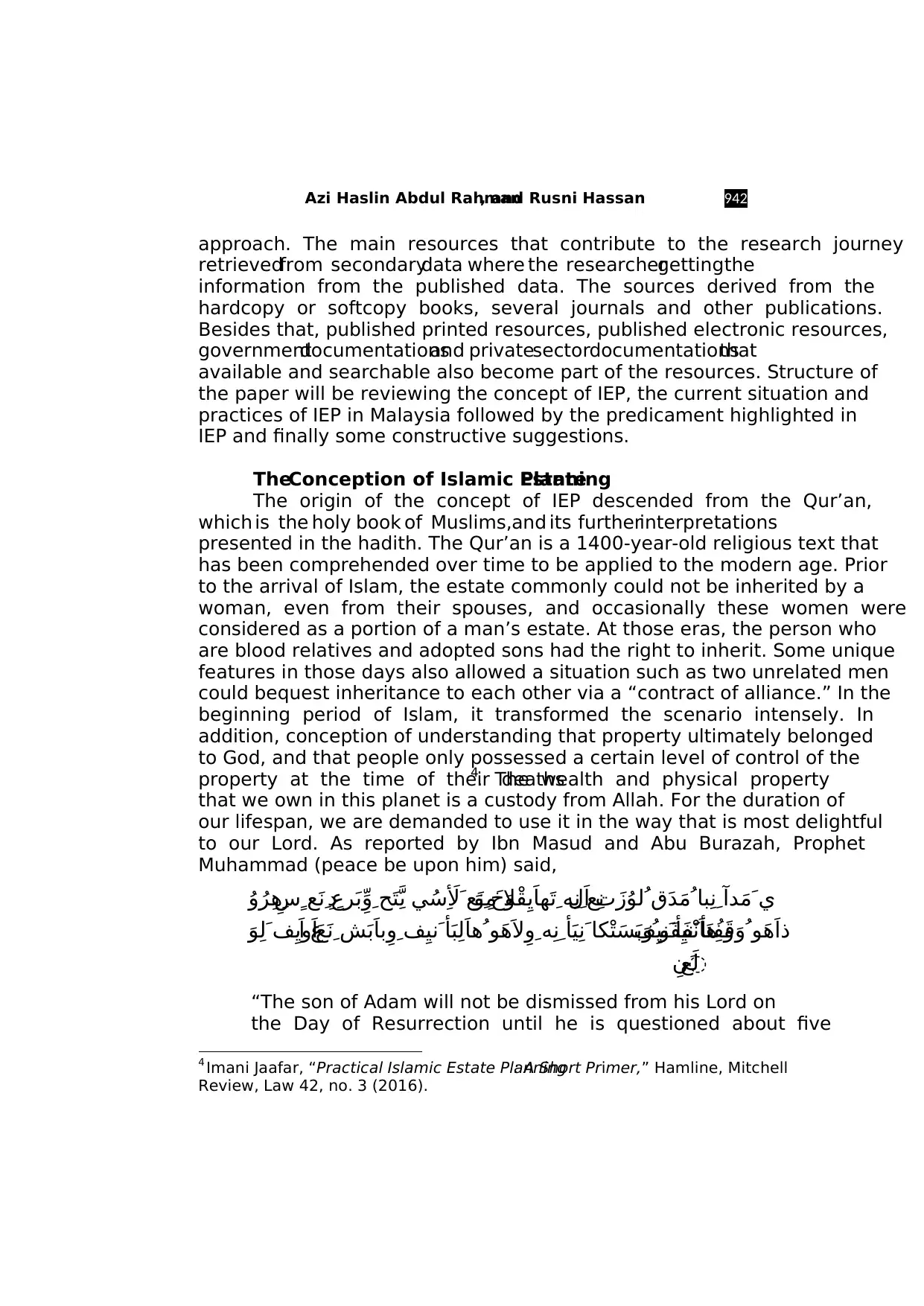
942, and Rusni HassanAzi Haslin Abdul Rahman
approach. The main resources that contribute to the research journey
retrievedfrom secondarydata where the researchergettingthe
information from the published data. The sources derived from the
hardcopy or softcopy books, several journals and other publications.
Besides that, published printed resources, published electronic resources,
governmentdocumentationsand privatesectordocumentationsthat
available and searchable also become part of the resources. Structure of
the paper will be reviewing the concept of IEP, the current situation and
practices of IEP in Malaysia followed by the predicament highlighted in
IEP and finally some constructive suggestions.
TheConception of Islamic EstatePlanning
The origin of the concept of IEP descended from the Qur’an,
which is the holy book of Muslims,and its furtherinterpretations
presented in the hadith. The Qur’an is a 1400-year-old religious text that
has been comprehended over time to be applied to the modern age. Prior
to the arrival of Islam, the estate commonly could not be inherited by a
woman, even from their spouses, and occasionally these women were
considered as a portion of a man’s estate. At those eras, the person who
are blood relatives and adopted sons had the right to inherit. Some unique
features in those days also allowed a situation such as two unrelated men
could bequest inheritance to each other via a “contract of alliance.” In the
beginning period of Islam, it transformed the scenario intensely. In
addition, conception of understanding that property ultimately belonged
to God, and that people only possessed a certain level of control of the
property at the time of their deaths4. The wealth and physical property
that we own in this planet is a custody from Allah. For the duration of
our lifespan, we are demanded to use it in the way that is most delightful
to our Lord. As reported by Ibn Masud and Abu Burazah, Prophet
Muhammad (peace be upon him) said,ُ
هِرُو ِع نَع س ِتَح وِِّبَر دَِِّ سُي ىِأَلَِ وَخ نَعَنِع نِه تَهاَيِقْال مِوي مَدآ نِبا مَدَق لوُزَت اَل َ
اَويِف لِو َع اَذاَهَو وَقَفِنَأ نيِفَو وَبَسَتْكا نِيَأ نِه وِالَهَو هاَلِبَأ نيِف وِباَبَش نَعو هاَنْفَأ نيِفِ
نََلَع
“The son of Adam will not be dismissed from his Lord on
the Day of Resurrection until he is questioned about five
4 Imani Jaafar, “Practical Islamic Estate Planning: A Short Primer,” Hamline, Mitchell
Review, Law 42, no. 3 (2016).
approach. The main resources that contribute to the research journey
retrievedfrom secondarydata where the researchergettingthe
information from the published data. The sources derived from the
hardcopy or softcopy books, several journals and other publications.
Besides that, published printed resources, published electronic resources,
governmentdocumentationsand privatesectordocumentationsthat
available and searchable also become part of the resources. Structure of
the paper will be reviewing the concept of IEP, the current situation and
practices of IEP in Malaysia followed by the predicament highlighted in
IEP and finally some constructive suggestions.
TheConception of Islamic EstatePlanning
The origin of the concept of IEP descended from the Qur’an,
which is the holy book of Muslims,and its furtherinterpretations
presented in the hadith. The Qur’an is a 1400-year-old religious text that
has been comprehended over time to be applied to the modern age. Prior
to the arrival of Islam, the estate commonly could not be inherited by a
woman, even from their spouses, and occasionally these women were
considered as a portion of a man’s estate. At those eras, the person who
are blood relatives and adopted sons had the right to inherit. Some unique
features in those days also allowed a situation such as two unrelated men
could bequest inheritance to each other via a “contract of alliance.” In the
beginning period of Islam, it transformed the scenario intensely. In
addition, conception of understanding that property ultimately belonged
to God, and that people only possessed a certain level of control of the
property at the time of their deaths4. The wealth and physical property
that we own in this planet is a custody from Allah. For the duration of
our lifespan, we are demanded to use it in the way that is most delightful
to our Lord. As reported by Ibn Masud and Abu Burazah, Prophet
Muhammad (peace be upon him) said,ُ
هِرُو ِع نَع س ِتَح وِِّبَر دَِِّ سُي ىِأَلَِ وَخ نَعَنِع نِه تَهاَيِقْال مِوي مَدآ نِبا مَدَق لوُزَت اَل َ
اَويِف لِو َع اَذاَهَو وَقَفِنَأ نيِفَو وَبَسَتْكا نِيَأ نِه وِالَهَو هاَلِبَأ نيِف وِباَبَش نَعو هاَنْفَأ نيِفِ
نََلَع
“The son of Adam will not be dismissed from his Lord on
the Day of Resurrection until he is questioned about five
4 Imani Jaafar, “Practical Islamic Estate Planning: A Short Primer,” Hamline, Mitchell
Review, Law 42, no. 3 (2016).
Paraphrase This Document
Need a fresh take? Get an instant paraphrase of this document with our AI Paraphraser
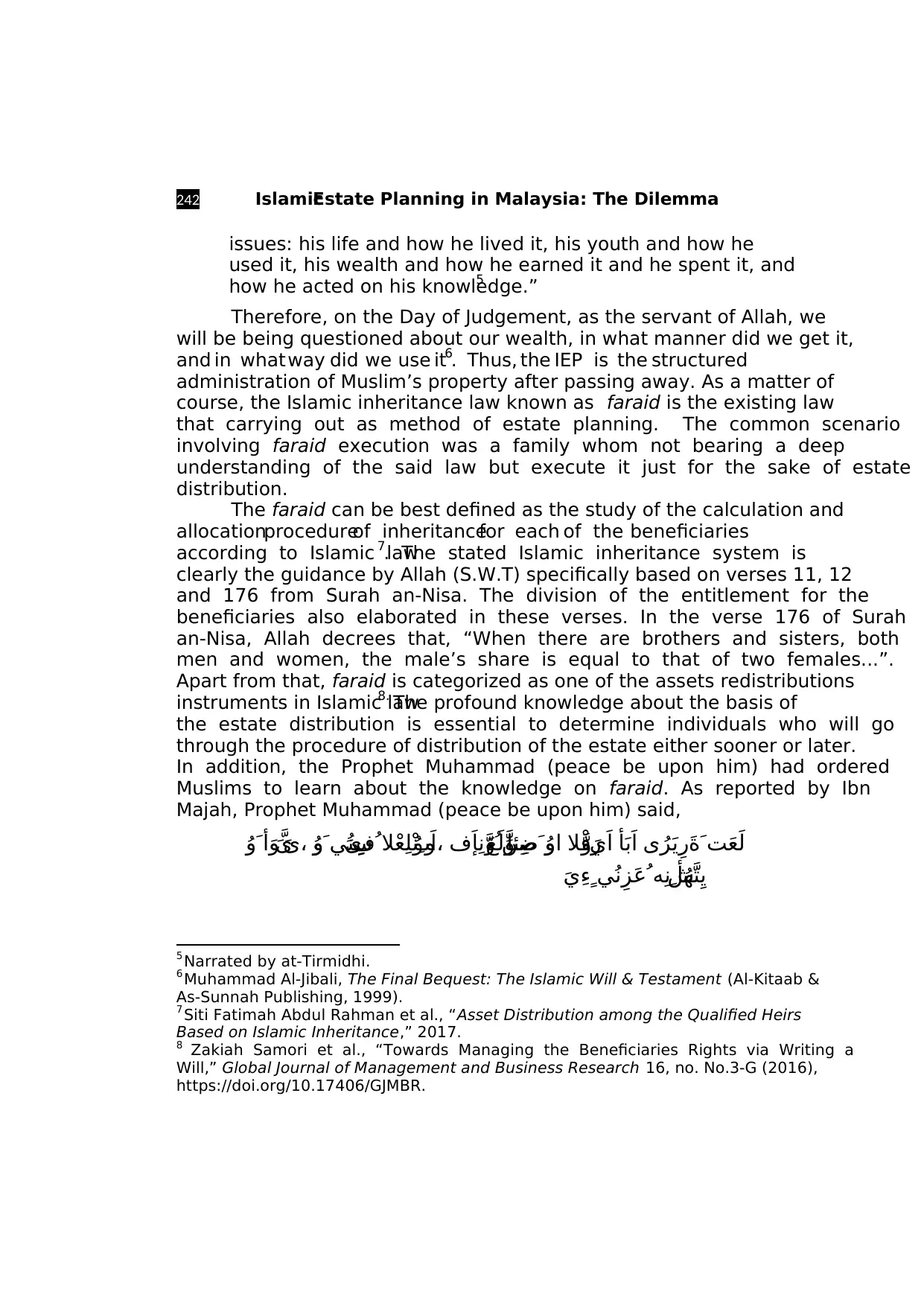
242 IslamicEstate Planning in Malaysia: The Dilemma
issues: his life and how he lived it, his youth and how he
used it, his wealth and how he earned it and he spent it, and
how he acted on his knowledge.”5
Therefore, on the Day of Judgement, as the servant of Allah, we
will be being questioned about our wealth, in what manner did we get it,
and in what way did we use it6. Thus, the IEP is the structured
administration of Muslim’s property after passing away. As a matter of
course, the Islamic inheritance law known as faraid is the existing law
that carrying out as method of estate planning. The common scenario
involving faraid execution was a family whom not bearing a deep
understanding of the said law but execute it just for the sake of estate
distribution.
The faraid can be best defined as the study of the calculation and
allocationprocedureof inheritancefor each of the beneficiaries
according to Islamic law7. The stated Islamic inheritance system is
clearly the guidance by Allah (S.W.T) specifically based on verses 11, 12
and 176 from Surah an-Nisa. The division of the entitlement for the
beneficiaries also elaborated in these verses. In the verse 176 of Surah
an-Nisa, Allah decrees that, “When there are brothers and sisters, both
men and women, the male’s share is equal to that of two females...”.
Apart from that, faraid is categorized as one of the assets redistributions
instruments in Islamic law8. The profound knowledge about the basis of
the estate distribution is essential to determine individuals who will go
through the procedure of distribution of the estate either sooner or later.
In addition, the Prophet Muhammad (peace be upon him) had ordered
Muslims to learn about the knowledge on faraid. As reported by Ibn
Majah, Prophet Muhammad (peace be upon him) said,ُ
وَأ وَِّ َى َو ،ىُسِنُي وَىِو نْلِعْال ف ُف ،اَىوَإَِ نَِّ صِن وَلَعِّ وَو ضِئا ُرَفْال اوَِّولَعَت ةَرِيَرُى اَبَأ اَيَ
هُأ نِه عَزِنُي ءِيَِّيِتش
5 Narrated by at-Tirmidhi.
6 Muhammad Al-Jibali, The Final Bequest: The Islamic Will & Testament (Al-Kitaab &
As-Sunnah Publishing, 1999).
7 Siti Fatimah Abdul Rahman et al., “Asset Distribution among the Qualified Heirs
Based on Islamic Inheritance,” 2017.
8 Zakiah Samori et al., “Towards Managing the Beneficiaries Rights via Writing a
Will,” Global Journal of Management and Business Research 16, no. No.3-G (2016),
https://doi.org/10.17406/GJMBR.
issues: his life and how he lived it, his youth and how he
used it, his wealth and how he earned it and he spent it, and
how he acted on his knowledge.”5
Therefore, on the Day of Judgement, as the servant of Allah, we
will be being questioned about our wealth, in what manner did we get it,
and in what way did we use it6. Thus, the IEP is the structured
administration of Muslim’s property after passing away. As a matter of
course, the Islamic inheritance law known as faraid is the existing law
that carrying out as method of estate planning. The common scenario
involving faraid execution was a family whom not bearing a deep
understanding of the said law but execute it just for the sake of estate
distribution.
The faraid can be best defined as the study of the calculation and
allocationprocedureof inheritancefor each of the beneficiaries
according to Islamic law7. The stated Islamic inheritance system is
clearly the guidance by Allah (S.W.T) specifically based on verses 11, 12
and 176 from Surah an-Nisa. The division of the entitlement for the
beneficiaries also elaborated in these verses. In the verse 176 of Surah
an-Nisa, Allah decrees that, “When there are brothers and sisters, both
men and women, the male’s share is equal to that of two females...”.
Apart from that, faraid is categorized as one of the assets redistributions
instruments in Islamic law8. The profound knowledge about the basis of
the estate distribution is essential to determine individuals who will go
through the procedure of distribution of the estate either sooner or later.
In addition, the Prophet Muhammad (peace be upon him) had ordered
Muslims to learn about the knowledge on faraid. As reported by Ibn
Majah, Prophet Muhammad (peace be upon him) said,ُ
وَأ وَِّ َى َو ،ىُسِنُي وَىِو نْلِعْال ف ُف ،اَىوَإَِ نَِّ صِن وَلَعِّ وَو ضِئا ُرَفْال اوَِّولَعَت ةَرِيَرُى اَبَأ اَيَ
هُأ نِه عَزِنُي ءِيَِّيِتش
5 Narrated by at-Tirmidhi.
6 Muhammad Al-Jibali, The Final Bequest: The Islamic Will & Testament (Al-Kitaab &
As-Sunnah Publishing, 1999).
7 Siti Fatimah Abdul Rahman et al., “Asset Distribution among the Qualified Heirs
Based on Islamic Inheritance,” 2017.
8 Zakiah Samori et al., “Towards Managing the Beneficiaries Rights via Writing a
Will,” Global Journal of Management and Business Research 16, no. No.3-G (2016),
https://doi.org/10.17406/GJMBR.
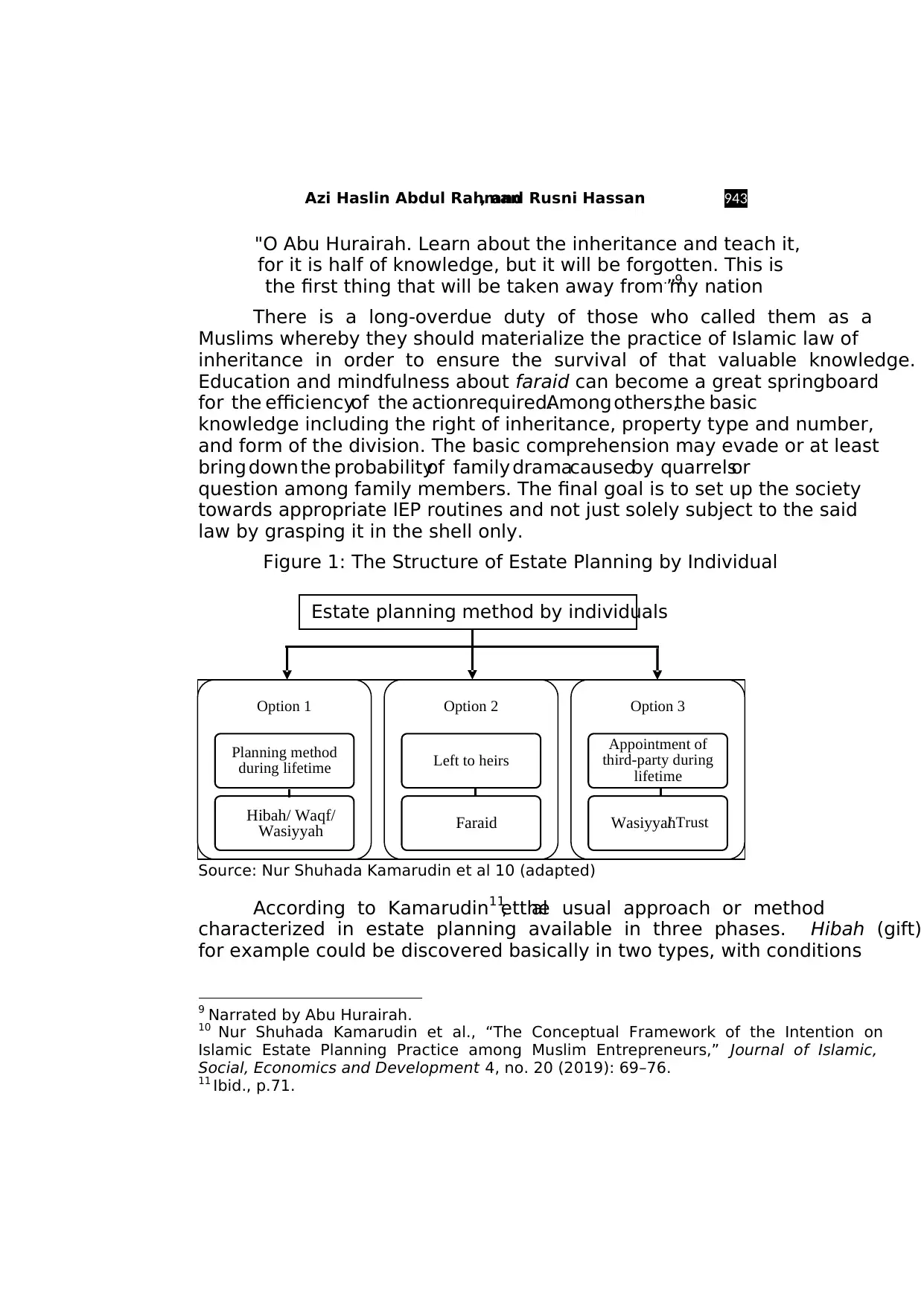
943, and Rusni HassanAzi Haslin Abdul Rahman
"O Abu Hurairah. Learn about the inheritance and teach it,
for it is half of knowledge, but it will be forgotten. This is
the first thing that will be taken away from my nation.”9
There is a long-overdue duty of those who called them as a
Muslims whereby they should materialize the practice of Islamic law of
inheritance in order to ensure the survival of that valuable knowledge.
Education and mindfulness about faraid can become a great springboard
for the efficiencyof the actionrequired.Among others,the basic
knowledge including the right of inheritance, property type and number,
and form of the division. The basic comprehension may evade or at least
bring down the probabilityof family dramacausedby quarrelsor
question among family members. The final goal is to set up the society
towards appropriate IEP routines and not just solely subject to the said
law by grasping it in the shell only.
Figure 1: The Structure of Estate Planning by Individual
Source: Nur Shuhada Kamarudin et al 10 (adapted)
According to Kamarudin et al11
, the usual approach or method
characterized in estate planning available in three phases. Hibah (gift)
for example could be discovered basically in two types, with conditions
9 Narrated by Abu Hurairah.
10 Nur Shuhada Kamarudin et al., “The Conceptual Framework of the Intention on
Islamic Estate Planning Practice among Muslim Entrepreneurs,” Journal of Islamic,
Social, Economics and Development 4, no. 20 (2019): 69–76.
11 Ibid., p.71.
Option 1
Planning method
during lifetime
Hibah/ Waqf/
Wasiyyah
Option 2
Left to heirs
Faraid
Option 3
Appointment of
third-party during
lifetime
Wasiyyah/ Trust
Estate planning method by individuals
"O Abu Hurairah. Learn about the inheritance and teach it,
for it is half of knowledge, but it will be forgotten. This is
the first thing that will be taken away from my nation.”9
There is a long-overdue duty of those who called them as a
Muslims whereby they should materialize the practice of Islamic law of
inheritance in order to ensure the survival of that valuable knowledge.
Education and mindfulness about faraid can become a great springboard
for the efficiencyof the actionrequired.Among others,the basic
knowledge including the right of inheritance, property type and number,
and form of the division. The basic comprehension may evade or at least
bring down the probabilityof family dramacausedby quarrelsor
question among family members. The final goal is to set up the society
towards appropriate IEP routines and not just solely subject to the said
law by grasping it in the shell only.
Figure 1: The Structure of Estate Planning by Individual
Source: Nur Shuhada Kamarudin et al 10 (adapted)
According to Kamarudin et al11
, the usual approach or method
characterized in estate planning available in three phases. Hibah (gift)
for example could be discovered basically in two types, with conditions
9 Narrated by Abu Hurairah.
10 Nur Shuhada Kamarudin et al., “The Conceptual Framework of the Intention on
Islamic Estate Planning Practice among Muslim Entrepreneurs,” Journal of Islamic,
Social, Economics and Development 4, no. 20 (2019): 69–76.
11 Ibid., p.71.
Option 1
Planning method
during lifetime
Hibah/ Waqf/
Wasiyyah
Option 2
Left to heirs
Faraid
Option 3
Appointment of
third-party during
lifetime
Wasiyyah/ Trust
Estate planning method by individuals
⊘ This is a preview!⊘
Do you want full access?
Subscribe today to unlock all pages.

Trusted by 1+ million students worldwide
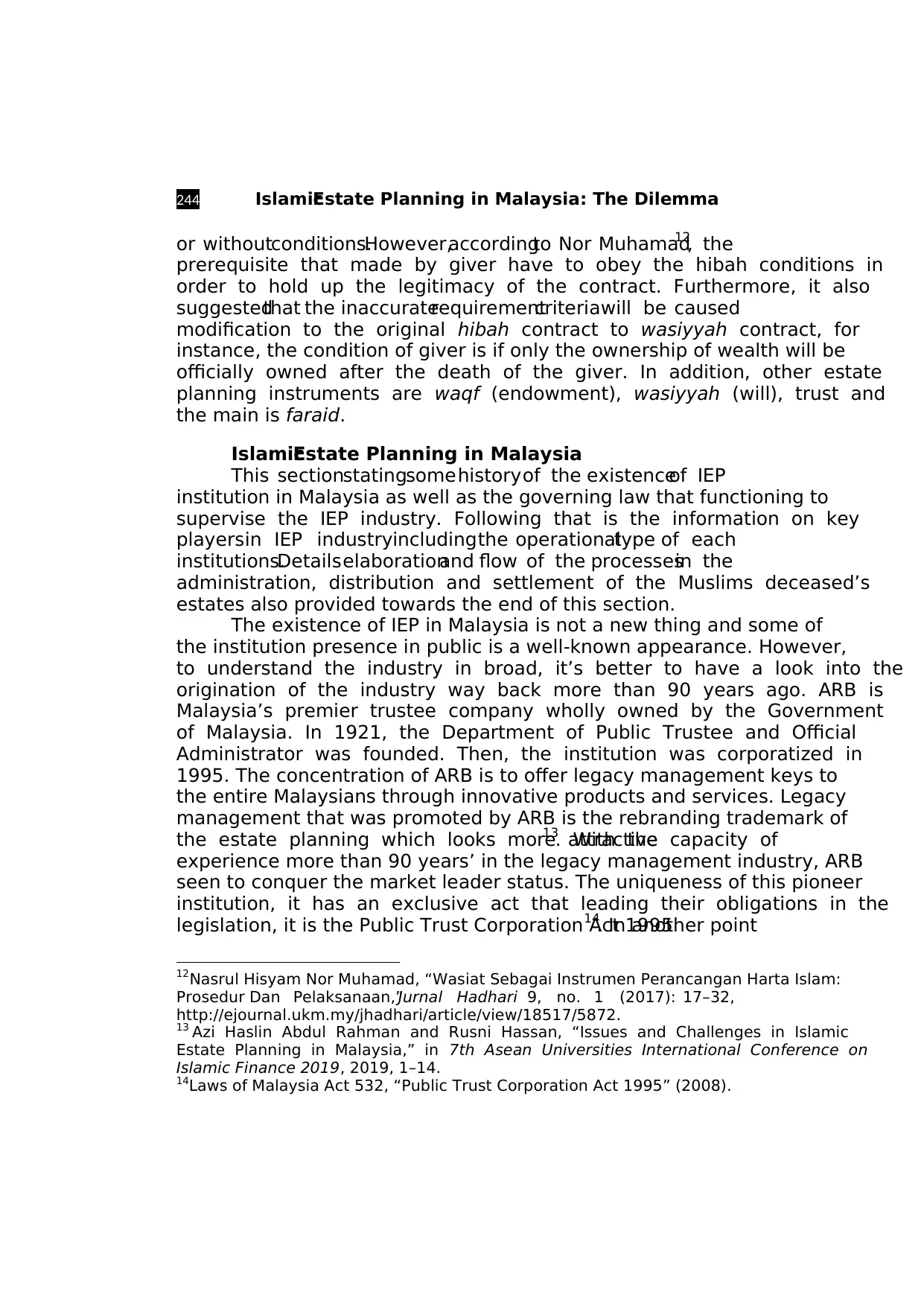
244 IslamicEstate Planning in Malaysia: The Dilemma
or withoutconditions.However,accordingto Nor Muhamad12
, the
prerequisite that made by giver have to obey the hibah conditions in
order to hold up the legitimacy of the contract. Furthermore, it also
suggestedthat the inaccuraterequirementcriteriawill be caused
modification to the original hibah contract to wasiyyah contract, for
instance, the condition of giver is if only the ownership of wealth will be
officially owned after the death of the giver. In addition, other estate
planning instruments are waqf (endowment), wasiyyah (will), trust and
the main is faraid.
IslamicEstate Planning in Malaysia
This sectionstatingsome history of the existenceof IEP
institution in Malaysia as well as the governing law that functioning to
supervise the IEP industry. Following that is the information on key
playersin IEP industryincluding the operationaltype of each
institutions.Details elaborationand flow of the processesin the
administration, distribution and settlement of the Muslims deceased’s
estates also provided towards the end of this section.
The existence of IEP in Malaysia is not a new thing and some of
the institution presence in public is a well-known appearance. However,
to understand the industry in broad, it’s better to have a look into the
origination of the industry way back more than 90 years ago. ARB is
Malaysia’s premier trustee company wholly owned by the Government
of Malaysia. In 1921, the Department of Public Trustee and Official
Administrator was founded. Then, the institution was corporatized in
1995. The concentration of ARB is to offer legacy management keys to
the entire Malaysians through innovative products and services. Legacy
management that was promoted by ARB is the rebranding trademark of
the estate planning which looks more attractive13
. With the capacity of
experience more than 90 years’ in the legacy management industry, ARB
seen to conquer the market leader status. The uniqueness of this pioneer
institution, it has an exclusive act that leading their obligations in the
legislation, it is the Public Trust Corporation Act 199514
. In another point
12 Nasrul Hisyam Nor Muhamad, “Wasiat Sebagai Instrumen Perancangan Harta Islam:
Prosedur Dan Pelaksanaan,”Jurnal Hadhari 9, no. 1 (2017): 17–32,
http://ejournal.ukm.my/jhadhari/article/view/18517/5872.
13 Azi Haslin Abdul Rahman and Rusni Hassan, “Issues and Challenges in Islamic
Estate Planning in Malaysia,” in 7th Asean Universities International Conference on
Islamic Finance 2019, 2019, 1–14.
14Laws of Malaysia Act 532, “Public Trust Corporation Act 1995” (2008).
or withoutconditions.However,accordingto Nor Muhamad12
, the
prerequisite that made by giver have to obey the hibah conditions in
order to hold up the legitimacy of the contract. Furthermore, it also
suggestedthat the inaccuraterequirementcriteriawill be caused
modification to the original hibah contract to wasiyyah contract, for
instance, the condition of giver is if only the ownership of wealth will be
officially owned after the death of the giver. In addition, other estate
planning instruments are waqf (endowment), wasiyyah (will), trust and
the main is faraid.
IslamicEstate Planning in Malaysia
This sectionstatingsome history of the existenceof IEP
institution in Malaysia as well as the governing law that functioning to
supervise the IEP industry. Following that is the information on key
playersin IEP industryincluding the operationaltype of each
institutions.Details elaborationand flow of the processesin the
administration, distribution and settlement of the Muslims deceased’s
estates also provided towards the end of this section.
The existence of IEP in Malaysia is not a new thing and some of
the institution presence in public is a well-known appearance. However,
to understand the industry in broad, it’s better to have a look into the
origination of the industry way back more than 90 years ago. ARB is
Malaysia’s premier trustee company wholly owned by the Government
of Malaysia. In 1921, the Department of Public Trustee and Official
Administrator was founded. Then, the institution was corporatized in
1995. The concentration of ARB is to offer legacy management keys to
the entire Malaysians through innovative products and services. Legacy
management that was promoted by ARB is the rebranding trademark of
the estate planning which looks more attractive13
. With the capacity of
experience more than 90 years’ in the legacy management industry, ARB
seen to conquer the market leader status. The uniqueness of this pioneer
institution, it has an exclusive act that leading their obligations in the
legislation, it is the Public Trust Corporation Act 199514
. In another point
12 Nasrul Hisyam Nor Muhamad, “Wasiat Sebagai Instrumen Perancangan Harta Islam:
Prosedur Dan Pelaksanaan,”Jurnal Hadhari 9, no. 1 (2017): 17–32,
http://ejournal.ukm.my/jhadhari/article/view/18517/5872.
13 Azi Haslin Abdul Rahman and Rusni Hassan, “Issues and Challenges in Islamic
Estate Planning in Malaysia,” in 7th Asean Universities International Conference on
Islamic Finance 2019, 2019, 1–14.
14Laws of Malaysia Act 532, “Public Trust Corporation Act 1995” (2008).
Paraphrase This Document
Need a fresh take? Get an instant paraphrase of this document with our AI Paraphraser
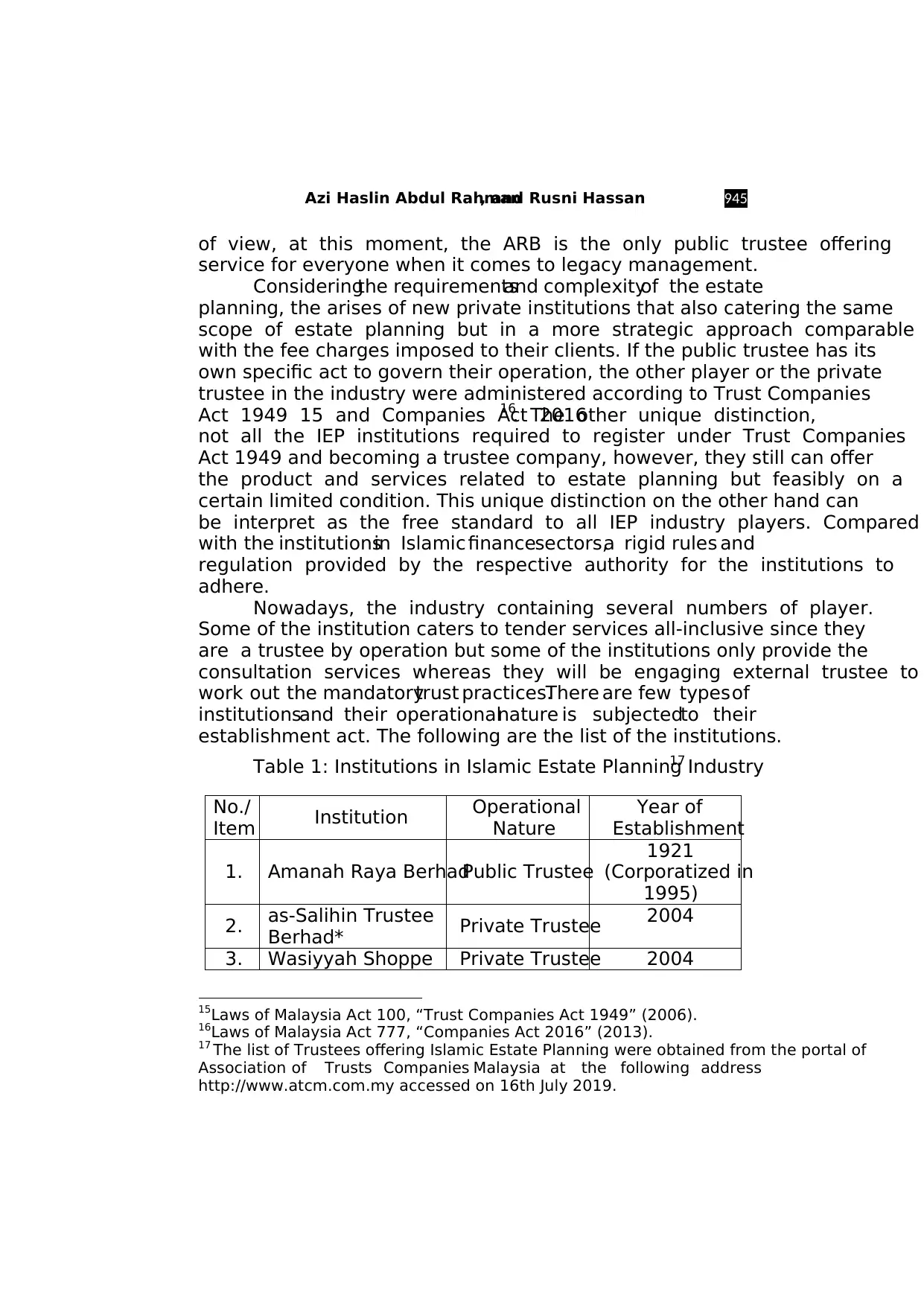
945, and Rusni HassanAzi Haslin Abdul Rahman
of view, at this moment, the ARB is the only public trustee offering
service for everyone when it comes to legacy management.
Consideringthe requirementsand complexityof the estate
planning, the arises of new private institutions that also catering the same
scope of estate planning but in a more strategic approach comparable
with the fee charges imposed to their clients. If the public trustee has its
own specific act to govern their operation, the other player or the private
trustee in the industry were administered according to Trust Companies
Act 1949 15 and Companies Act 201616
. The other unique distinction,
not all the IEP institutions required to register under Trust Companies
Act 1949 and becoming a trustee company, however, they still can offer
the product and services related to estate planning but feasibly on a
certain limited condition. This unique distinction on the other hand can
be interpret as the free standard to all IEP industry players. Compared
with the institutionsin Islamic financesectors,a rigid rules and
regulation provided by the respective authority for the institutions to
adhere.
Nowadays, the industry containing several numbers of player.
Some of the institution caters to tender services all-inclusive since they
are a trustee by operation but some of the institutions only provide the
consultation services whereas they will be engaging external trustee to
work out the mandatorytrust practices.There are few types of
institutionsand their operationalnature is subjectedto their
establishment act. The following are the list of the institutions.
Table 1: Institutions in Islamic Estate Planning Industry17
No./
Item Institution Operational
Nature
Year of
Establishment
1. Amanah Raya BerhadPublic Trustee
1921
(Corporatized in
1995)
2. as-Salihin Trustee
Berhad* Private Trustee 2004
3. Wasiyyah Shoppe Private Trustee 2004
15Laws of Malaysia Act 100, “Trust Companies Act 1949” (2006).
16Laws of Malaysia Act 777, “Companies Act 2016” (2013).
17 The list of Trustees offering Islamic Estate Planning were obtained from the portal of
Association of Trusts Companies Malaysia at the following address
http://www.atcm.com.my accessed on 16th July 2019.
of view, at this moment, the ARB is the only public trustee offering
service for everyone when it comes to legacy management.
Consideringthe requirementsand complexityof the estate
planning, the arises of new private institutions that also catering the same
scope of estate planning but in a more strategic approach comparable
with the fee charges imposed to their clients. If the public trustee has its
own specific act to govern their operation, the other player or the private
trustee in the industry were administered according to Trust Companies
Act 1949 15 and Companies Act 201616
. The other unique distinction,
not all the IEP institutions required to register under Trust Companies
Act 1949 and becoming a trustee company, however, they still can offer
the product and services related to estate planning but feasibly on a
certain limited condition. This unique distinction on the other hand can
be interpret as the free standard to all IEP industry players. Compared
with the institutionsin Islamic financesectors,a rigid rules and
regulation provided by the respective authority for the institutions to
adhere.
Nowadays, the industry containing several numbers of player.
Some of the institution caters to tender services all-inclusive since they
are a trustee by operation but some of the institutions only provide the
consultation services whereas they will be engaging external trustee to
work out the mandatorytrust practices.There are few types of
institutionsand their operationalnature is subjectedto their
establishment act. The following are the list of the institutions.
Table 1: Institutions in Islamic Estate Planning Industry17
No./
Item Institution Operational
Nature
Year of
Establishment
1. Amanah Raya BerhadPublic Trustee
1921
(Corporatized in
1995)
2. as-Salihin Trustee
Berhad* Private Trustee 2004
3. Wasiyyah Shoppe Private Trustee 2004
15Laws of Malaysia Act 100, “Trust Companies Act 1949” (2006).
16Laws of Malaysia Act 777, “Companies Act 2016” (2013).
17 The list of Trustees offering Islamic Estate Planning were obtained from the portal of
Association of Trusts Companies Malaysia at the following address
http://www.atcm.com.my accessed on 16th July 2019.
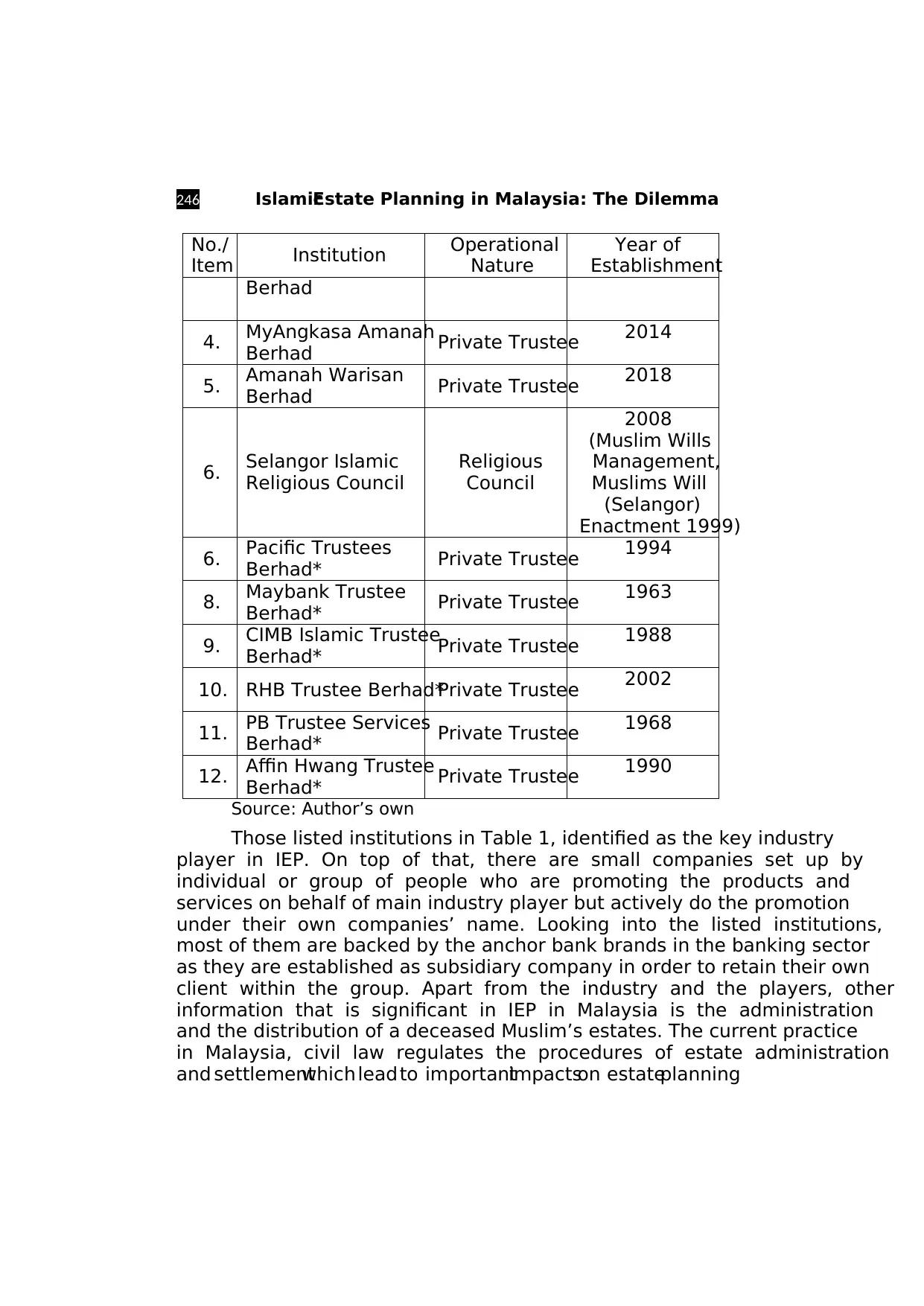
246 IslamicEstate Planning in Malaysia: The Dilemma
No./
Item Institution Operational
Nature
Year of
Establishment
Berhad
4. MyAngkasa Amanah
Berhad Private Trustee 2014
5. Amanah Warisan
Berhad Private Trustee 2018
6. Selangor Islamic
Religious Council
Religious
Council
2008
(Muslim Wills
Management,
Muslims Will
(Selangor)
Enactment 1999)
6. Pacific Trustees
Berhad* Private Trustee 1994
8. Maybank Trustee
Berhad* Private Trustee 1963
9. CIMB Islamic Trustee
Berhad* Private Trustee 1988
10. RHB Trustee Berhad*Private Trustee 2002
11. PB Trustee Services
Berhad* Private Trustee 1968
12. Affin Hwang Trustee
Berhad* Private Trustee 1990
Source: Author’s own
Those listed institutions in Table 1, identified as the key industry
player in IEP. On top of that, there are small companies set up by
individual or group of people who are promoting the products and
services on behalf of main industry player but actively do the promotion
under their own companies’ name. Looking into the listed institutions,
most of them are backed by the anchor bank brands in the banking sector
as they are established as subsidiary company in order to retain their own
client within the group. Apart from the industry and the players, other
information that is significant in IEP in Malaysia is the administration
and the distribution of a deceased Muslim’s estates. The current practice
in Malaysia, civil law regulates the procedures of estate administration
and settlementwhich lead to importantimpactson estateplanning
No./
Item Institution Operational
Nature
Year of
Establishment
Berhad
4. MyAngkasa Amanah
Berhad Private Trustee 2014
5. Amanah Warisan
Berhad Private Trustee 2018
6. Selangor Islamic
Religious Council
Religious
Council
2008
(Muslim Wills
Management,
Muslims Will
(Selangor)
Enactment 1999)
6. Pacific Trustees
Berhad* Private Trustee 1994
8. Maybank Trustee
Berhad* Private Trustee 1963
9. CIMB Islamic Trustee
Berhad* Private Trustee 1988
10. RHB Trustee Berhad*Private Trustee 2002
11. PB Trustee Services
Berhad* Private Trustee 1968
12. Affin Hwang Trustee
Berhad* Private Trustee 1990
Source: Author’s own
Those listed institutions in Table 1, identified as the key industry
player in IEP. On top of that, there are small companies set up by
individual or group of people who are promoting the products and
services on behalf of main industry player but actively do the promotion
under their own companies’ name. Looking into the listed institutions,
most of them are backed by the anchor bank brands in the banking sector
as they are established as subsidiary company in order to retain their own
client within the group. Apart from the industry and the players, other
information that is significant in IEP in Malaysia is the administration
and the distribution of a deceased Muslim’s estates. The current practice
in Malaysia, civil law regulates the procedures of estate administration
and settlementwhich lead to importantimpactson estateplanning
⊘ This is a preview!⊘
Do you want full access?
Subscribe today to unlock all pages.

Trusted by 1+ million students worldwide
1 out of 34
Your All-in-One AI-Powered Toolkit for Academic Success.
+13062052269
info@desklib.com
Available 24*7 on WhatsApp / Email
![[object Object]](/_next/static/media/star-bottom.7253800d.svg)
Unlock your academic potential
Copyright © 2020–2026 A2Z Services. All Rights Reserved. Developed and managed by ZUCOL.